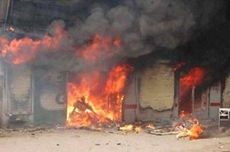11 get life, 13 others shorter terms for Gulbarg massacre
17 Jun 2016
Calling the massacre of 69 people at the Gulbarg Society in Gujarat in 2002 the "darkest day in the history of civil society", a court in Ahmedabad today sentenced 11 people to life imprisonment,12 others to seven years in jail and one other to 10 years in jail.
 The special investigation court had on 2 June found 24 people guilty, 11 of them of murder, in the 14-year-old case.
The special investigation court had on 2 June found 24 people guilty, 11 of them of murder, in the 14-year-old case.
Sixty-nine people, including former Congress MP Ehsan Jafri, were killed on 28 February 2002 in the communal violence that ravaged Gujarat.
The slain former minister's wife, Zakia Jafri, said she was unhappy with the quantum of the sentence and would challenge the order.
''We are back where we started,'' she said. ''After so many people died, that's all the court could decide? Just 12 guilty? I will have to fight this.''
Civil rights activist Teesta Setalvad, who has been fighting for justice for the victims, welcomed the verdict but expressed disappointment with the ''lesser sentence''.
''We will appeal against the lesser sentence for those who haven't been awarded life imprisonment,'' she said.
On Thursday the ministry of home affairs cancelled the FCRA licence of Setalvad's 23-year-old NGO Sabrang Trust allegedly for diverting the money donated to her trust to help riot victims to the her personal bank account (See: Home ministry cancels FCRA licence of Teesta Setalvad's NGO Sabrang).
Relatives of the convicts, on the other hand, claimed they were innocent and that they would appeal against the sentence in higher courts.
Justice P B Desai, while acquitting 36 people, including alleged main conspirator, Bharatiya Janata Party councillor Bipin Patel, rejected claims that the attack on the predominantly Muslim residential area was planned.
The court rejected the charge of criminal conspiracy against all the 66 accused, saying there was no evidence that the mob attack was planned and not a spontaneous act, as alleged by victims.
Arguing against capital punishment, the defence, led by advocate Abhay Bhardwaj, sought lighter punishment. It based its argument on the court ruling out the conspiracy angle.
The two sides concluded the arguments on 10 June.
A mob carrying weapons attacked the cluster of 29 bungalows and 10 apartments on 28 February 2002, a day after 59 Hindu activists were killed when a coach of the Sabarmati Express was burnt in nearby Godhra. The massacre was one of the worst single incidents in the days-long riots in Gujarat that left more than 1,000 people, most of them Muslims, dead.


















